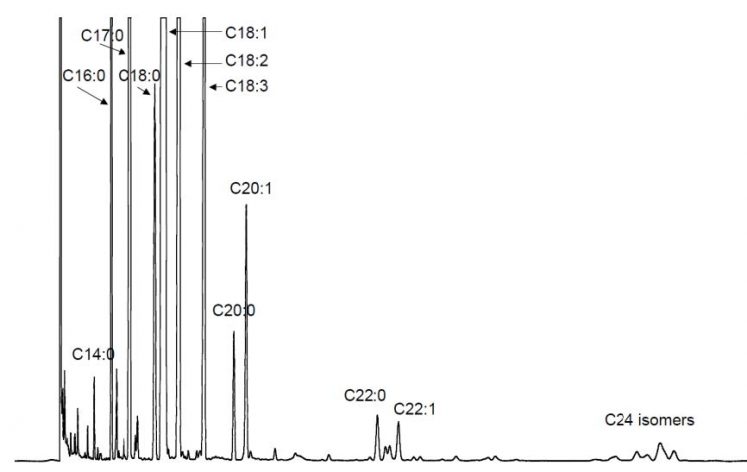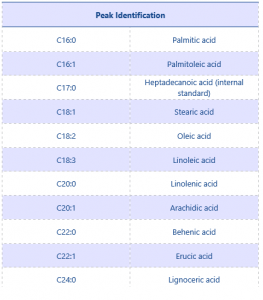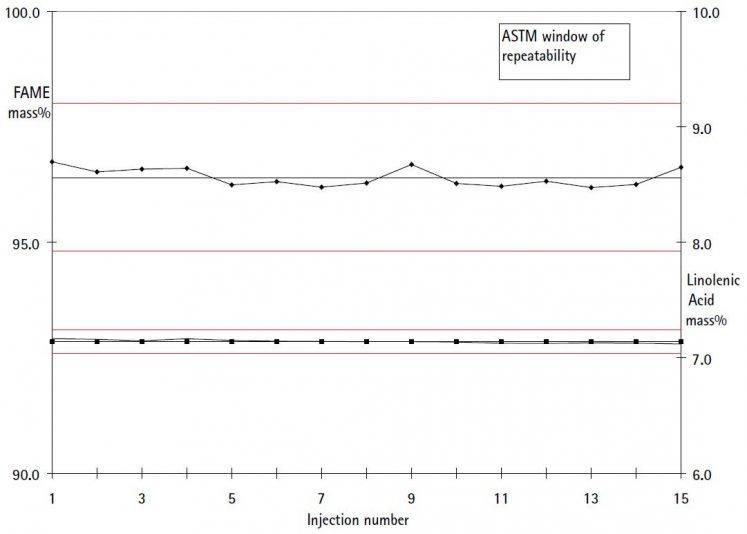EN 14103 - Determination of Total FAME and Linolenic Acid Methyl Esters in Biodiesel
Total FAME and Linolenic Acid Methyl Esters in Biodiesel
Introduction
For biodiesel to be used as a motor fuel or blended with petroleum diesel, it must conform to standard specifications (ASTM D 6751 or EN 14214). There are standard GC methods to determine if biodiesel conforms to the standard specifications, one of which is EN 14103, used to determine the ester and linoleic acid methyl ester content. Other methods include EN-14105 / ASTM D 6584 (free and total glycerin and mono, di and triglyceride content) and EN 14110 (residual methanol). Scion Instruments has designed GC solutions for each of these standard methods. This application note describes work conducted on the SCION Instruments 8300 gas chromatograph to analyze biodiesel (B-100) in accordance with EN 14103.
EN 14103 is used to verify that the ester content of Fatty Acid Methyl Esters (FAME) is greater than 90 % and that the linolenic acid content is between 1 % (m/m) and 15 % (m/m) consistent with EN 14214 specifications.
This method is suitable for FAME which contains methyl esters between C14 and C24.

Fig.1 Biodiesel Chromatogram

Table 1. Peak Identification
Experimental
The SCION Biodiesel analyser for EN 14103 is based on our 8300 GC platform, a split/splitless injector, a SCION WAXMS analytical column and an FID Detector. Analytical conditions for the EN 14103 analysis can be found in table 1. When the conditions outlined below are applied, a chromatogram is obtained, as in Figure 1.
| Injector | Split/Splitless @ 250°C |
| Column | 30m x 0. 25 mm x 0. 25 μm
SCION WAXMS (SC32423) |
| Oven Program | 210ºC Isothermal |
| Carrier | Helium @ 12 psi (83 kPa) |
| Detector | FID @ 250ºC |
| Inj. Volume | 1µl |
| Software | Compass CDS |
Table 2. Analytical Conditions
Sample Preparation
Accurately weigh approximately 250 mg of sample in a 10 mL vial, then add 5 mL of methyl heptadecanoate solution (10 mg / mL) using a
pipette.
Calculations
The ester content (C), expressed as a mass fraction in percent, is calculated using the following formula:

Where:
ΣA → total peak area from C14:0 to C24:1
AEI → peak area of C17:0
CEI → is the concentration, in mg/ml, of the C17:0 solution
VEI → volume, in ml, of the C17:0 solution
m → mass, in mg, of the sample
The linolenic acid methyl ester content (L), expressed as a mass fraction in percent, is calculated using the following formula:

Where:
ΣA → total peak area from C14:0 to C24:1
AEI → peak area of C17:0
AL → peak area of C18:3
Results
The results of the biodiesel assay are stated in Table 3. The biodiesel sample tested was shown to be in accordance with the requirements stated in EN 14214 (the method requirements: FAME content > 96.5 % (m/m) and linolenic acid content < 12 % (m/m)).
In order to verify the integrity of the system, repeatability was determined (n=15). See Table 4 and Figure 2. A relative standard deviation of 0.21 % was achieved. Figure 2 shows the mass % results of the subsequent injections and the absolute difference obtained compared to specification limits.
| Area (µV.min) | Quantity (%m/m) | |
| FAME | 103139 | 96,6 |
| Linolenic Acid | 7599,2 | 7,1 |
Table 3. Analytical results Biodiesel Assay
| Quantity (%m/m) | Quantity (%m/m) | |
| Average | 96,4 | 7,1 |
| Standard Deviation | 0,20 | 0,015 |
| RSD (%) | 0,21 | 0,21 |
Table 4. Repeatability Results

Fig. 2 Repeatability figures. Red lines indicate the maximum and minimum allowed variation limits specified in the method.
Conclusion
This application note demonstrates the suitability of SCION Instruments Analyser for EN 14103, for the analysis of biodiesel. The repeatability data demonstrates good system integrity. The biodiesel sample tested in this application note fulfilled the requirements stated in EN 14214 Therefore, the system is well suited to the analysis of total FAME and Linolenic Acid Methyl Esters in Biodiesel According to EN 14103.
Download the Application Note
You can download the complete application note as a pdf: Determination of Total FAME and Linolenic Acid Methyl Esters in Biodiesel
